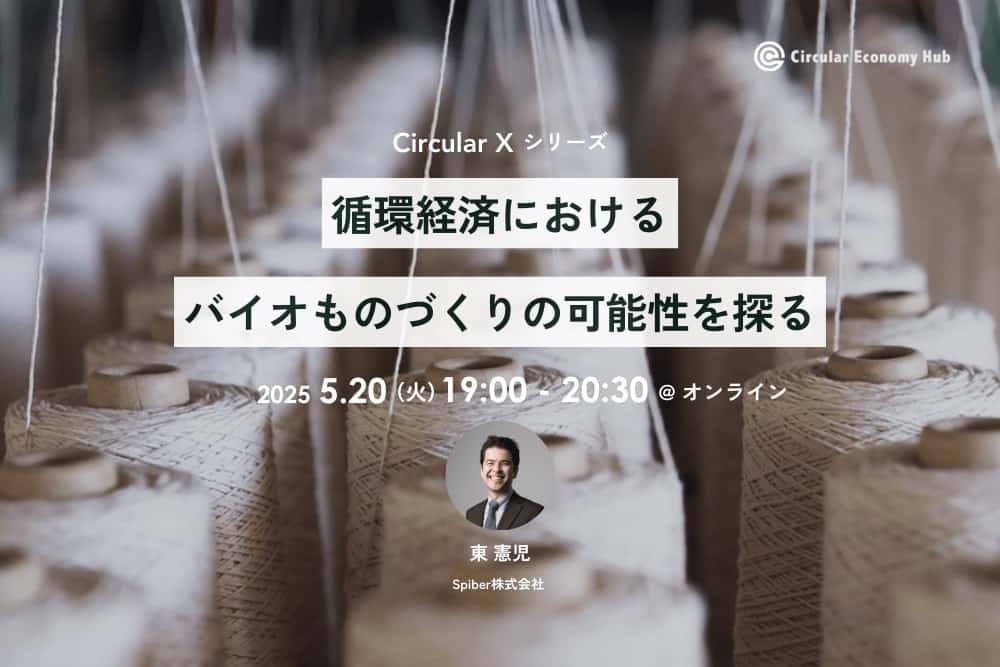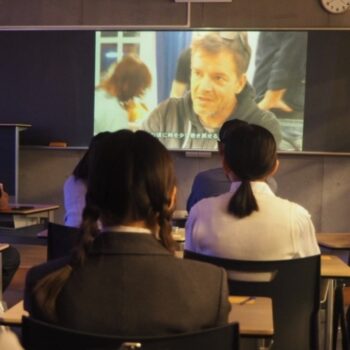
Circular Economy Hub held learning program Circular X on “Exploring the potential of bio-based manufacturing in the circular economy.”
- On May 29, 2025
- bio manufacturing, bioeconomy, bioresources, carbon cycle, Circular Economy, Circular Economy Hub, circular society, Circular X, decarbonization, SDGs
Circular Economy Hub has been hosting the monthly online learning program series “Circular X” since 2021, offering opportunities to explore the future of circular economy practices across various industries and sectors.
The theme for May 2025 was “Exploring the potential of bio-based manufacturing in the circular economy.”

Bioeconomy, which utilizes biological resources (biomass) and biotechnology, is recognized as a model that contributes to the circular economy. Not only does it help mitigate climate change by reducing dependence on fossil resources, but it also has the potential for market growth, particularly in major countries, as it balances environmental sustainability with economic development.
In the manufacturing sector, sustainable practices are accelerating through the use of materials and products such as bioplastics, biofuels, and fermentation-based technologies. With connections to both the biological and technical cycles depicted in the butterfly diagram of the circular economy, bio-based manufacturing has been gaining attention in recent years as a model that promotes circular use of bioresources.
Japanese companies, with their advanced technological capabilities and unique fermentation processes, have the potential to be competitive in the global market of bio-based manufacturing.
In this event, we introduced global strategies and examples of bio-based manufacturing closely linked to the circular economy, while considering how bio-based production can contribute to carbon cycling and the transition to a circular society, as well as the considerations necessary for its implementation. As a guest speaker, we welcomed Kenji Higashi, executive officer at Spiber Inc., a biotech venture that develops and produces the synthetic protein material “Brewed Protein™” using microorganisms. Higashi shared insights on the reasons behind Spiber’s introduction of Brewed Protein™ into the sports apparel industry and the significance of applying renewable materials that can circulate within Earth’s ecosystems, including proteins, as key materials in high environmental-impact industries.
Speaker
Kenji Higashi / Head of sustainability and executive officer, Spiber Inc.
 Born in Mie Prefecture in 1982. Studied under Professor Masaru Tomita at Keio University Institute for Advanced Biosciences. After completing his master’s degree, he joined Accenture and engaged in management consulting. He joined Spiber in 2013, where he was involved in corporate planning and business development. Currently, he leads the sustainability division from the company’s European branch in Paris.
Born in Mie Prefecture in 1982. Studied under Professor Masaru Tomita at Keio University Institute for Advanced Biosciences. After completing his master’s degree, he joined Accenture and engaged in management consulting. He joined Spiber in 2013, where he was involved in corporate planning and business development. Currently, he leads the sustainability division from the company’s European branch in Paris.
[Reference] Exploring the potential of bio-based manufacturing in the circular economy: Online event Circular X on may 20 | Peatix (in Japanese)
[Related Site] Circular Economy Hub (in Japanese)







